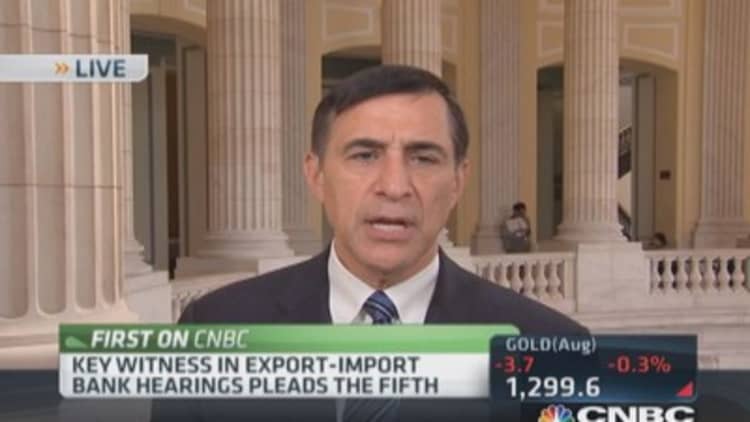A US Congress decision to close the country's Export-Import Bank would damage American companies trying to do business in Africa, says the head of a leading US company.
The warning by Jeff Immelt, chairman of General Electric, came as Washington tries to boost US-Africa trade in an effort to catch up with China, Japan and the EU, whose economic links with Africa are booming.
Read MoreObamato CEOs: Quit complaining
The charter of the ExIm Bank, which provides credit to foreign buyers of US products, expires in September and attempts to reauthorise the bank have faltered amid strong opposition from conservative Republicans who see it as a form of crony capitalism. Congress is now in recess until September 8.
Mr Immelt said the ExIm Bank was crucial for US companies operating in Africa because it showed the government was prepared to have "some skin in the game." The closure of ExIm Bank would mean "we are basically making a statement as a country that we do not think that exports are important," said Mr Immelt, who will announce on Monday $2bn of new investment by GE in Africa.
The warning came as President Barack Obama welcomes nearly 50 heads of state from Africa in the first summit between the US and the region. The White House has said a key objective of the summit is to increase trade.
The fierce debate over the ExIm Bank has become the latest in a series of disagreements between the often Republican-leaning business community and anti-government conservatives in the Houses of Representatives. After spending two years heading the Obama White House's council on jobs and competitiveness, Mr Immelt has been a particular target of Tea Party attacks on big business.
Read MoreObamahosts Africa summit with an eye on legacy
The ExIm Bank's cause suffered a sharp blow when Eric Cantor, the Republican majority leader in the House, lost his primary election campaign to a Tea Party rival.
Mr Obama, who as a presidential candidate was once sharply critical of the ExIm Bank, waded into the debate on Friday.

"Every country does this. It's traditionally been championed by Republicans," he said." But for some reason, right now the House Republicans have decided that we shouldn't do this."
As a result, when companies like Boeing and GE were competing for contracts with German or Chinese rivals "we may lose that sale", he said.
Research this year by George Mason University showed that 10 US companies receive three-quarters of ExIm Bank financing, with GE among the main beneficiaries. GE is likely to be one of the biggest participants in the Obama administration's Power Africa initiative to provide $7bn backing for energy projects in the continent over the next five years.
The Standard & Poor's rating agency warned in July that dissolution of the ExIm Bank could have a "significant" long-term impact on Boeing, the commercial aircraft maker which receives more than a third of the bank's credit.
Read MoreNever heard of theEx-Im Bank? Here's why you will
The US is the only major bloc that today trades less with Africa than it did before the global financial crisis in 2007-8. The drop is, in part, due to a collapse in US oil imports from Africa but it also signals that the US is losing market share to China and other emerging countries, the EU and Japan.
Mr Immelt said the group's Africa business was doubling every four to five years and was "top of the line" in terms of regional growth rates. Within a few years, it was likely to be a similar size to its Latin America operations. The new investments to be announced this week include a manufacturing and assembly facility in Nigeria and a research facility in South Africa. The continent's infrastructure needs alone presented a $90bn opportunity.
—By Geoff Dyer, Financial Times. Additional reporting by Javier Blas in London

